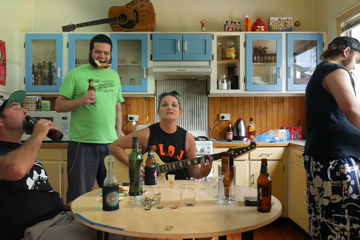Will Eno is the playwright equivalent of an artist whose paintings are indistinguishable from photos: they may look deceptively ordinary, but it takes a tremendous amount of skill to precisely capture the uncanniness of real life. The apparently mundane has been a surprisingly generous muse for Eno, whose cannon reveals a knack for conjuring spooling narratives from the most unassuming events. But arguably, his most impressive slight of hand is his ability to infuse those everyday occurrences with authentically gripping drama. “I’m naturally drawn to those kinds of small, earthbound details of life,” Eno admits, adding, “But isn’t everyone?”
Indeed, he has a point. Eno's characters and scenarios largely exist outside any specific time or place. He deals in accessibly human experiences, and as such, his theatre has found favour in many countries beyond his native America. But more than this, his characters are neither elite or deprived, red neck or white-collar. They occupy a middle ground, their concerns pitted against challenges that have little to do with social or economic status, and more do to with the emotional, visceral business of living itself.
On reflection, Eno believes his signature tonality – a fascination with excavating human drama from the humdrum – is a reflex acquired in his formative years. “I suppose as a person, I was a relatively late bloomer. I went through a lot of those learning curves people might experience in their late teens during my 20s and 30s. I always had to go to a job, just to get some money for rent and food, because I really didn’t have any other structure in my life other than that. So for me, at that time, the so called ‘drama of life’ was just being alive, living day to day,” he shares.
"I’m naturally drawn to those kinds of small, earthbound details of life"
“So I think when I’m imagining how a person might react to a particular situation, it’s in those quiet moments, when you’re just going through the motions of your life, that are in fact the most dramatic. I guess it’s always seemed strange when I’m working on a play to reach for massive events, because in my own life, those kinds of catastrophes have never happened. That doesn’t mean I haven’t found life hard or faced conflict, just not in a big existential way, you know? What I mean is, it could be a Tuesday afternoon and you might break a shoelace or something like that. But then suddenly, because you broke that shoelace, you’re having a very different day than you were before."
Don't miss a beat with our FREE daily newsletter
While it may, on paper, sound like a dull conceit for just one play, let alone an entire oeuvre, Eno’s texts are extremely well-heeled as far as critical praise and award recognition is concerned. Among his laurels, he boasts a prestigious Pulitzer Prize nomination for his 70-minute, 2004-written monologue, Thom Pain (based on nothing) — a mercurial ode to the subtle yet powerful influences of throwaway happenings.
In fact, as with real life, Eno's ponderings on the human condition are as filled with wit and comedy as they are quiet meditation. And yet, while Eno’s theatre exists in an aesthetic of naturalism, it also subversively bucks against that affect. Some dramatists, including Eno’s talented countrywoman Annie Baker, have gravitated towards a hyper-realist approach for their theatre, attempting to painstakingly reproduce the perfect forgery of real life. Eno likens his variety of truth to that of the great Russian playwright Chekhov, whose plays wrestle with the thick and heavy fug of personal ennui churning beneath the surface of calm, controlled demeanours. This affinity for his 19th-century counterpart is particularly apparent in The Realistic Joneses, which receives its Australian premiere at Red Stitch Actors Theatre this month. It explores that most ordinary of relationships, the arbitrary connection between next door neighbours, counterpointed against that most profound of human concerns, our innate fear of our inevitable mortality.
Intriguingly, Eno speaks about his work with a sense of objective mystery, seemingly recognising various cultural and personal reference points to his work after the fact. “I had never really thought that I would write anything modelled on Chekhov, but as I look back on certain plays I’ve written, there is definitely a common thread. It's that question: what do you do when faced with impossible problems?” he offers in wistful, hushed tones. “In The Realistic Joneses, I hope that the disease that becomes such an important part of the plot was explicit enough that it could be a detail that the audience could latch onto it, but also ambiguous, and generally menacing enough in its symptoms that it would be a symbol for death and the loss of our humanity. But if you were to look at it from a Chekhovian perspective, it’s a play that asks what does the modern consciousness do when faced with things that’s can’t be solved?”
Red Stitch Actors Theatre presents The Realistic Joneses 25 Apr — 28 May.















